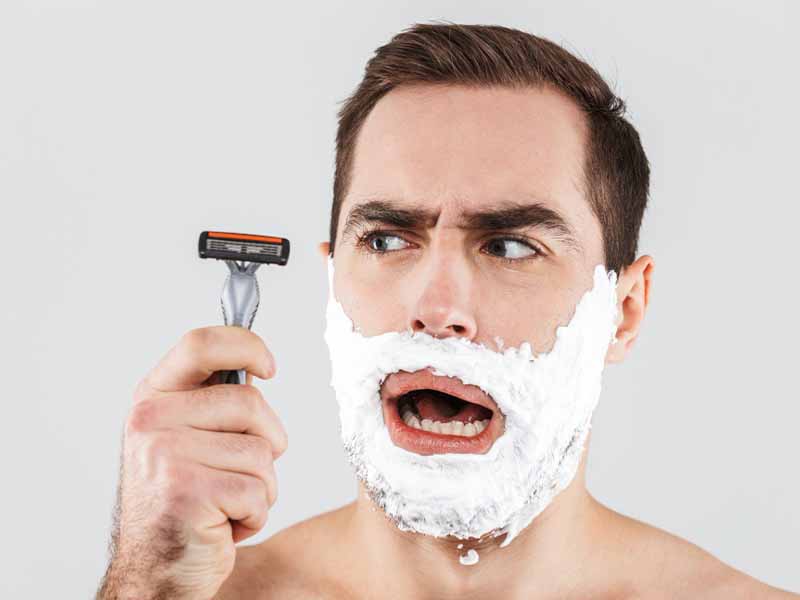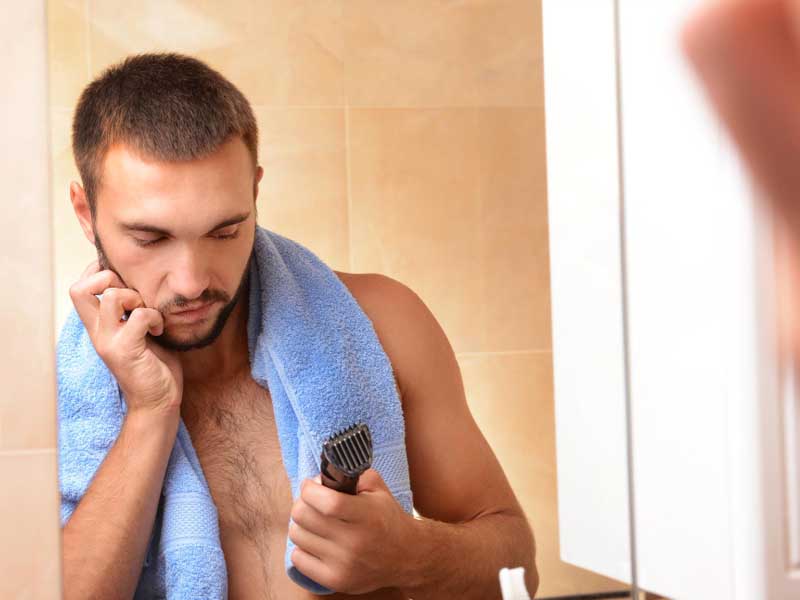Shaving with acne-prone skin can be challenging as it can cause irritation, razor bumps, and further breakouts. However, with the right precautions and care, it is possible to achieve a smooth shave without exacerbating your skin condition. In this article, we will provide you with a dermatologist’s advice on smooth shaving for acne-prone skin, including the best way to shave with acne, how to shave with acne scars, and how to care for your skin after shaving. By following these tips and using the right products and techniques, you can help reduce the risk of irritation, razor burn, and breakouts.
Can You Shave with Acne?
The answer is yes, you can shave with acne, but you need to take some precautions.
Acne is caused by an overproduction of sebum, which clogs the pores and causes inflammation. Shaving with acne can be challenging as it can cause irritation, razor bumps, and further breakouts. However, with the right precautions and care, it is possible to shave with acne.

One of the main concerns when shaving with acne is the risk of infection. If you have open acne sores, it is essential to avoid shaving over them, as it can lead to further infection and scarring. It is also crucial to avoid using old or dirty razors, as they can harbor bacteria that can worsen acne.
Another concern is the potential for irritation and inflammation. Acne-prone skin is often sensitive, and shaving can cause redness and inflammation. Choosing the right products and using the proper technique can help reduce the risk of irritation.
Overall, while shaving with acne can be challenging, it is possible with proper care and attention. By taking the necessary precautions and using the right products, you can achieve a smooth shave without aggravating your acne.
Read this article about acne to learn more about it and how to effectively treat it, and discover the solutions that can help you achieve clear, healthy skin.
Best Way to Shave with Acne
Shaving with acne can be a challenge, but with the right preparation and technique, you can achieve a smooth shave without exacerbating your skin condition. Here are some tips on the best way to shave with acne:
1. Prepare Your Skin
Before shaving, it’s essential to prepare your skin properly. Clean your face thoroughly with a gentle cleanser, and exfoliate the skin to remove dead skin cells that can clog pores and lead to breakouts. Using warm water to soften the hairs and open up the pores can also help.
2. Use the Right Shaving Cream
Using a shaving cream or gel can help lubricate the skin, reducing the risk of irritation and razor burn. Choose a product that is specifically formulated for sensitive skin and free from harsh chemicals. Avoid using foams or products that contain alcohol, which can dry out the skin and exacerbate acne.
3. Use a Sharp Razor
Using a dull razor can cause more irritation and razor burn, leading to further breakouts. Always use a sharp razor to minimize the risk of cuts and ingrown hairs. If you have acne-prone skin, consider using a single-blade razor or an electric razor, as these are less likely to cause irritation.
4. Shave with the Grain
Shaving against the grain can cause more irritation and lead to ingrown hairs. Always shave with the grain of the hair to reduce the risk of irritation and cuts. Take your time and shave slowly and carefully, using short, light strokes.
5. Rinse Your Razor Frequently
Rinsing your razor frequently can help remove dead skin cells, hair, and shaving cream, which can clog the blades and lead to more irritation. Use warm water to rinse your razor thoroughly between strokes.
6. Moisturize After Shaving
After shaving, apply a moisturizer to help soothe the skin and reduce the risk of irritation. Choose a moisturizer that is oil-free and non-comedogenic, meaning it won’t clog your pores. This will help keep your skin hydrated and prevent further breakouts.

By following these tips and using the right products and techniques, you can help reduce the risk of irritation, razor burn, and breakouts.
Shave with Acne Scars
Shaving with acne scars can be a challenge, as the scars can be sensitive and prone to irritation. When shaving over acne scars, it’s important to be gentle and use the right techniques and tools to avoid further damage.
Acne scars are typically the result of inflammation, which can cause the skin to become raised or indented. These scars can be particularly sensitive to shaving, as the razor can further irritate the skin and potentially cause further scarring. It’s important to take extra care when shaving over acne scars to minimize the risk of irritation and further damage.

One important consideration when shaving over acne scars is the type of razor you use. A single-blade razor or an electric razor may be less irritating than a multi-blade razor. Additionally, using shaving cream or gel can help to lubricate the skin and reduce the risk of irritation and razor burn.
It’s also important to shave slowly and carefully, taking care not to apply too much pressure or shave too closely to the skin. Rinsing your razor frequently can help to remove dead skin cells, hair, and shaving cream, which can clog the blades and lead to more irritation.
If you experience any irritation or discomfort when shaving over acne scars, it may be best to avoid shaving in those areas altogether or to speak with a dermatologist for advice on how to best care for your skin.
Are acne-related challenges affecting your daily life? Don’t let them hinder your confidence. If you’re dealing with acne-prone skin, there’s hope. Our team of dedicated dermatologists at RemoteDerm is here to assist you. Whether you’re wondering how to shave with acne, addressing acne scars, or looking for effective solutions to manage your skin condition, our experts can help. By consulting with an acne dermatologist, you can take the first step towards clear, healthy skin.
Shaving Acne Skin
Shaving with acne-prone skin can be challenging, especially if you are not taking the proper precautions. When shaving, it is important to be gentle and avoid aggravating the acne, which can cause further breakouts and scarring.
If you have acne-prone skin, it is important to prepare your skin properly before shaving. Cleanse your face with a gentle cleanser and warm water to soften the hair and open up the pores. Exfoliating the skin before shaving can also help remove dead skin cells, which can clog pores and lead to breakouts.

When selecting a shaving cream or gel, choose a product that is formulated for sensitive skin and free from harsh chemicals. Using a sharp razor is also important to minimize the risk of irritation and cuts. Shave with the grain of the hair to reduce the risk of irritation and ingrown hairs.
After shaving, rinse your skin thoroughly with cool water to remove any remaining shaving cream or gel. Pat your skin dry with a clean towel and apply a gentle moisturizer to soothe the skin and reduce the risk of irritation. Avoid using heavy or oily products that can clog pores and worsen acne.
If you are experiencing severe acne or have concerns about shaving with acne-prone skin, consider consulting with a dermatologist for personalized advice and treatment options. With proper care and attention, you can achieve a smooth, irritation-free shave even with acne-prone skin.
Final Thoughts
In conclusion, shaving with acne-prone skin can be challenging, but it is possible with the right preparation and technique. It is crucial to take the necessary precautions to avoid infection, irritation, and inflammation. Choosing the right products, such as a shaving cream or gel, and using a sharp razor can help reduce the risk of irritation and razor burn. Moreover, shaving in the direction of hair growth and rinsing the razor frequently can prevent further breakouts.

Those living in remote areas may benefit from Remotederm Online dermatology consultation in the comfort of their homes, allowing them to receive proper guidance and care for their acne-prone skin. By following these tips and consulting with a dermatologist if necessary, individuals with acne-prone skin can achieve a smooth shave without worsening their skin condition.
FAQs
1. How can I prevent razor burn when shaving with acne-prone skin?
To prevent razor burn when shaving with acne-prone skin, use a sharp razor, shave with the grain, and rinse your razor frequently. Also, consider using shaving cream or gel that is specifically formulated for sensitive skin.
2. Is it better to shave before or after washing your face?
It’s better to wash your face before shaving to remove any dirt or oil that could clog your pores and cause breakouts. Also, washing your face can help soften the hairs and open up the pores, making it easier to get a smooth shave.
3. Should I apply aftershave after shaving with acne-prone skin?
It’s best to avoid using alcohol-based aftershaves as they can dry out the skin and exacerbate acne. Instead, apply a moisturizer to help soothe the skin and reduce the risk of irritation.
4. Can shaving make acne worse?
Shaving can potentially make acne worse if proper precautions and care are not taken. Shaving over open acne sores can lead to further infection and scarring, and using old or dirty razors can worsen acne by spreading bacteria. However, with the right preparation and technique, it is possible to achieve a smooth shave without exacerbating acne.
5. What should I do if I experience irritation or breakouts after shaving?
If you experience irritation or breakouts after shaving, avoid shaving for a few days to allow your skin to heal. Use a gentle cleanser to clean your face and avoid using any products that could further irritate your skin. Consider consulting a dermatologist for advice on how to manage your acne-prone skin.

2 comments
Thank you for this article. I’ve always wondered how to shave with acne without making it worse. Are there any specific shaving products you recommend for people with acne-prone skin?
Yes, there are shaving products that are specifically designed for people with acne-prone skin, such as those that contain salicylic acid or benzoyl peroxide. It’s important to choose products that are labeled as non-comedogenic, meaning they won’t clog your pores.